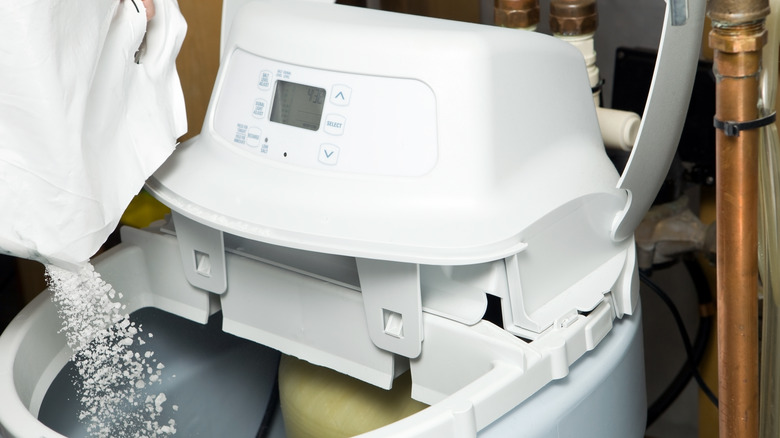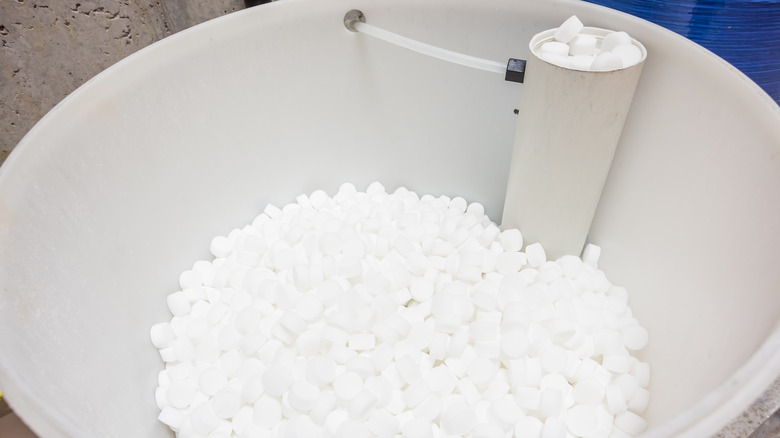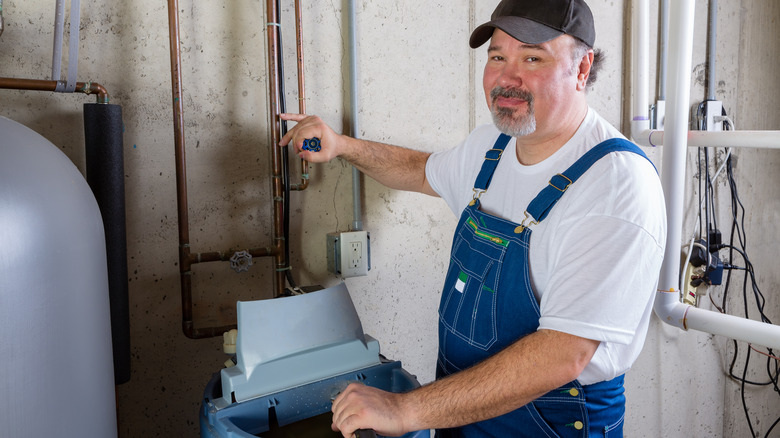Can You Build Your Own Water Softener And Is It A Good Idea? Our Plumbing Expert Weighs In
For many homes, the need to invest in a water softener is critical, especially if you live in an area with hard water. Using a water softener is an effective way of reducing the amount of heavy minerals found in the water your family is consuming. In areas with hard water, which contains high levels of iron, calcium, and magnesium, a water softener keeps the plumbing system working properly by preventing buildup that can cause faucets to leak and lines to back up. While most people typically purchase a manufactured water softening system, there are some DIY recommendations online that could help, but whether or not you should take that step depends on a few factors.
To get more information on whether or not you should build a DIY water softener, House Digest spoke to Chuck Pound, Master Plumber and Virtual Plumbing Expert at Frontdoor, in an exclusive interview. Our question was simple: Is this really something homeowners should take on themselves, and is it even possible to make these online DIY water softeners effective? He says, "Yes. There are online resources that can help with this project."
There are numerous signs that your home might benefit from a water softener, including limescale buildup on your showerhead or stains on the sink from hard water. Investing in a water softener is a good idea, but doing it yourself can pose a few problems. Pound shares some additional insights into the concerns.
What does it take for a DIY water softener to work?
A water softener's job is to remove excessive minerals from water through a process called ion exchange, which uses sodium. Most systems involve a large tank that requires water to pass through a layer of sodium-covered beads that pull out those minerals. The mechanism seems simple, but before you get started, consider what Chuck Pound shared in his exclusive interview with House Digest.
"From the research I have done [on online DIY projects], the job likely requires a moderate level of skill to get the results you want for softened, clean, potable water. I don't think this is a project for first-time DIYers." He also notes, "It will require researching and testing your water before getting started. Then, based on the method of DIY chosen, supplies will need to be gathered." Methods vary widely, but all of these projects involved at least some basic plumbing skills to remove water lines and reconnect them.
Because of the importance, and perhaps even the cost, of a project like this, it's critical to gather as much information as possible before making the decision. "I recommend downloading the Frontdoor App for free to speak live with a Plumbing Expert who can assess your existing plumbing system to make recommendations," shares Pound. Getting the system right for your home is critical, as even professionally manufactured and installed water softener systems do not last more than ten years before requiring replacement.
How to DIY a water softener yourself
For those who decide to install a water softener themselves, it's a good idea to research the options on the market. Fortunately, the U.S. Department of Energy has put together a guide regarding the different types of systems and what considerations should be made when deciding what water system is best for your home. It is important to consult a specialist to find which water softener system would best fit your home's needs.
Pound also noted, "Check with the local city code or water provider before attaching a device to public water systems. Before taking on any task regarding plumbing water supply, safety practices should be the first consideration." Each locality may have a different ordinance or law regarding water softener systems so it is very important to consult your local government prior to installation.
It's also wise to research how these systems function with the level of hard water you have, as well as the hidden downsides of water softeners. They do have ongoing maintenance and upkeep costs, so ensure they continue to work in a way that's beneficial for your home. More so, not everyone needs or will benefit from a water softener. A water test is the best way to find out if you need help, though reaching out to a professional for advice on this decision is always worthwhile as well.


